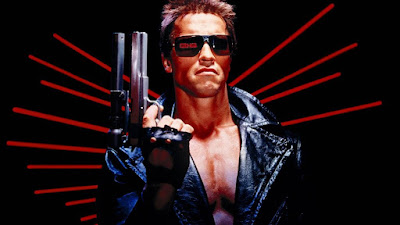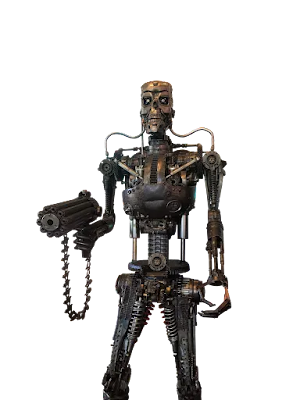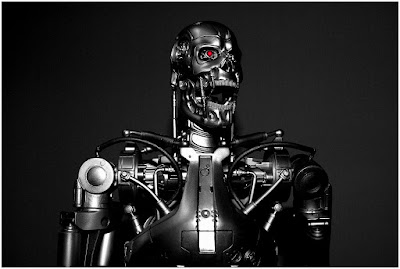The Terminator, which was released in 1984 and grossed
nearly $40 million at the domestic box office and untold sums in the ancillary
market while also spawning a multi-film franchise that continues to this day,
is one of the most well-known representations of artificial intelligence in
popular culture.
Despite the fact that the majority of the film takes place
in 1984, it shows a future in which Skynet, a military-designed artificial
intelligence system, becomes self-aware and wage war on mankind.
Shots from the future show roaming robot destroyers seeking
humans on a battlefield littered with mechanical wreckage and human bones, who
seem to be on the verge of extinction.
The majority of the movie is on a T-800 terminator (Arnold Schwarzenegger)
who is sent back to 1984 to murder Sarah Connor (Linda Hamilton) before she
gives birth to John Connor, humanity's future savior.
The fundamental story element of The Terminator dramatizes
what is likely the most prominent artificial intelligence myth in popular
culture: depicting intelligent machines as inherently dangerous beings capable
of rebelling against mankind in pursuit of their own agenda.
To fully comprehend the relevance of The Terminator, further information regarding the story as well as the character of the terminator must be provided.
Earth is in the middle of a conflict between humans and
Skynet-created robots in the year 2029, after a nuclear catastrophe.
Despite the fact that more information about Sky net is
disclosed in later installments of the series, its functionality remains a
mystery in the first film.
On the verge of defeat, John Connor (who is barely mentioned
in passing in the movie) leads a human resistance force that eventually
overcomes the robots.
The machines build a time-travel device to send one of their
terminator units back in time to assassinate Sarah Connor before she conceives
her savior son in order to foil the Connor-led revolt.
To thwart the robots' plot, the human resistance sends back
their own operative, Kyle Reese (Michael Biehn).
Reese is supposed to protect Sarah Connor while the
terminator is supposed to murder her.
As a result, the rest of the film, set in 1984, resembles a
cat and mouse pursuit in which the terminator tracks down Connor and Reese only
to escape by the skin of their teeth.
The Terminator is scorched to its mechanical endoskeleton in
the film's climax, and it follows Connor and Reese into a factory.
Reese conducts a self-sacrifice by putting a homemade pipe
bomb in the terminator's belly, killing him and severing the terminator in two.
Connor is pursued by the terminator's torso, which she is
able to smash using a hydraulic press.
The video then cuts to a pregnant Sarah Connor travelling
across Mexico some months later.
Reese is revealed to be John Connor's father in this scene.
The Terminator is a wonderful example of artificial
intelligence.
It can walk, speak, sense, and act like a human person,
while being a programmed murdering machine.
It has been shown that it can absorb interactional subtlety
and change its behavior depending on previous experiences and interactions.
In a phone conversation, the terminator can also simulate
the voice of Sarah Connor's mother, which convinces Sarah to divulge her
whereabouts to the terminator.
The terminator can unquestionably pass the Turing Test in
these areas (a test wherein a confederate is unable to determine if they are
communicating with a human or a robot).
The terminator, on the other hand, is devoid of human awareness and is guided by mechanical logic as it completes a task.
The terminator was shot, ran over by a Mac truck, and burnt
to its endoskeleton, among other traumas, thus it's safe to assume it doesn't
perceive pain like humans do.
Popular culture's pessimistic depictions of artificial
intelligence, such as The Terminator, give images of the future to be avoided.
President Ronald Reagan's Strategic Defense Initiative (later derisively nicknamed the Star Wars Initiative by Senator Ted Kennedy) unveiled in 1983 ratcheted up tensions with the Soviet Union at the time of the film's development.
In a nutshell, the Strategic Defensive Initiative was a
planned missile defense system that would protect the nation against ballistic
nuclear weapons assaults.
It was believed that Reagan's bluster might spark a nuclear
weapons race.
As a result, The Terminator may be viewed as a criticism of
Ronald Reagan's Cold War strategy in that it offers a look into a possible
post-apocalyptic future wrought by nuclear catastrophe and the development of
ever powerful weapons.
In summary, the film expresses concerns about human
creation's destructive potential and the possibility for humans' own inventions
to turn against them.
Find Jai on Twitter | LinkedIn | Instagram
You may also want to read more about Artificial Intelligence here.
See also:
Berserkers; de Garis, Hugo; Technological Singularity.
References And Further Reading
Brammer, Rebekah. 2018. “Welcome to the Machine: Artificial Intelligence on Screen.” Screen Education 90 (September): 38–45.
Brown, Richard, and Kevin S. Decker, eds. 2009. Terminator and Philosophy: I’ll Be Back, Therefore I Am. Hoboken, NJ: John Wiley and Sons.
Gramantieri, Riccardo. 2018. “Artificial Monsters: From Cyborg to Artificial Intelligence.” In Monsters of Film, Fiction, and Fable: The Cultural Links between the Human and Inhuman, edited by Lisa Wegner Bro, Crystal O’Leary-Davidson, and Mary Ann Gareis, 287–313. Newcastle upon Tyne, UK: Cambridge Scholars Publishing.
Jancovich, Mark. 1992. “Modernity and Subjectivity in The Terminator: The Machine as Monster in Contemporary American Culture.” Velvet Light Trap 30 (Fall): 3–17.








